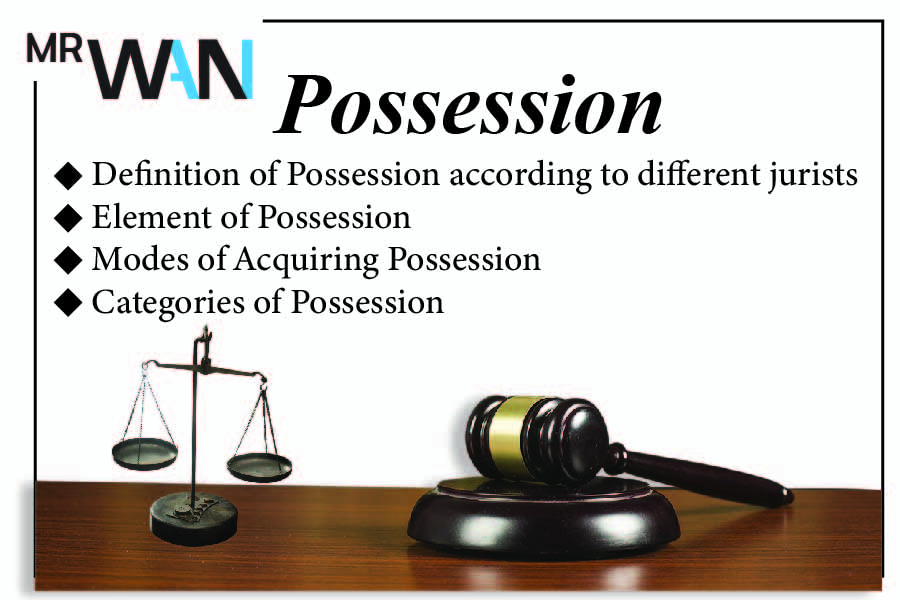Possession
“Possession” literary means physical control over a thing or an object. It expresses the closest relation of fact that can exist between a thing and the person, who possesss it. Possession means it includes not only physical control over a thing but an intention to exercise that physical control
Definition of Possession
The concept of possession is though basic and essential in human life . it is difficult to define. There are no fixed or precise definition of possession because it is legal as well as factual concept.
Some jurists have given different definition:
John Salmond:
Salmond defines possession as, “Possession is the continuing exercise of a claim to the exclusive use of an object.”
O.W. Holmes:
Holmes defines Possession as, “To gain Possession a man must stand in a certain physical relation to the object and to the rest of the world, and must have certain intent.”
Lhering:
The best among them is the definition given by Lhiring. According to him, “whenever a person looked like an owner in relation to a thing, he had possession of it unless Possession was denied to him by rules of law based on partical convenience.
Different between Ownership and Possession
- The idea of Ownership follows the idea of possession.
- First the idea of possession came into existence in the human civilization.
- Ownership is the de jure recognition of the right over the property.
- Possession is the de facto exercise of a claim over the property.
- Salmond says: “Whereas ownership is strictly a legal concept
- “Possession is both a legal and a non legal or pre- legal concept.
- Ownership is a matter of multiple rights.”
- “Whereas Possession in singular, but Stronger.”
Element of Possession
From the definitions we could see in that possession has two essentials elements.
- Actual power over the object possessed. i.e. Corpus possessionis
- Intention of the possessor to exclude any enterference from other. i.e. animus possidendi.
According to jhon salmond, both corpus and animus must be present to constitute Possession. Ownership is a legal concept where as possession is factual as well as legal concept.
The term corpus and term animus, both the terms borrowed from the Roman Law.
Categories of Possession
Possession is divided into two categories:
- Possession in Facts
- Possession in Law.
Possession in fact is actual or physical possession. It is physical relation to a thing. Possession in law mean possession in the eye of law. It means a possession which is recognized and protected by law. There is sometimes a discrepancy between possession in fact and position in law, although usually possession exists both in fact and in law in the same person. A person who is in de facto possession of a thing also comes to have de jure possession.
Modes of Acquiring Possession
There are 03 modes of acquiring possession
Delivery:
Delivery completes voluntary act from one person to another. The transferor gives actual position to the transferee. It is usually a lawful mode of possession. Delivery maybe actual of constructive. In actual delivery the thing is physically delivered.
In Constructive one element of possession (Corpus and animous) is missing while in actual delivery both element included.
Kinds of Constructive delivery.
Brevi manu
Short hand (brevi manu) – buyer already has
Constitutum possessorium
Transfer animous first then corpus.
Attornment
In attornment third person involve.
Taking:
Taking implies an Act exclusively on the part of the person who physically takes the possession. It is acquisition of the possession without the consent of pervious possessor. It is the possession without the consent of the possessor. Sometimes it is said to be the unilateral act.
Three kinds of Taking. Rightful taking, Wrongful taking, Original taking.
Operation of Law;
A third mode of the acquisition of possession is by operation of law. It takes place when by the operation of law goods are removed from the possession of one person to the other. For example, when a person dies, the things in his possession pass to personal representatives.
For latest article join our WhatsApp channel

